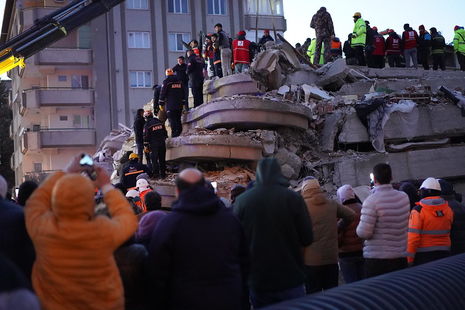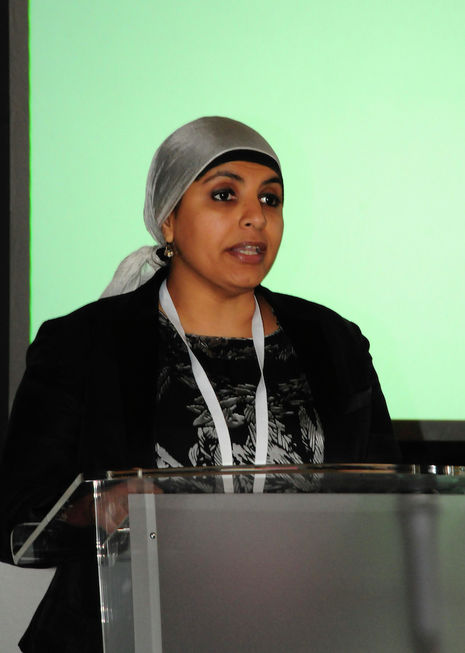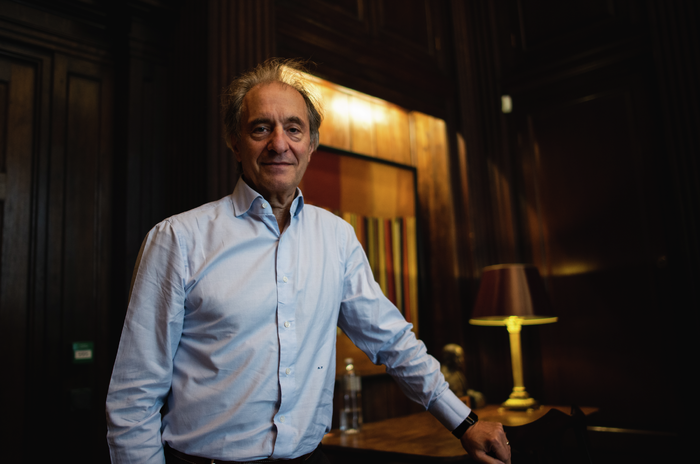Turkey-Syria earthquake response event hosts key figures on the ground
Scheduled speakers included representatives of the White Helmets, the general secretary of the Syrian British Medical Society and the director general of the Turkish Red Crescent

NGOs on the ground in Syria and Turkey came together to discuss humanitarian earthquake relief, in an event organised by PhD student Saleyha Ahsan earlier this week (10/02).
The event follows the earthquakes in southern Turkey and northern Syria on Monday (06/02), in which over 28,000 people are now known to have died. The event aimed to recognise the global and local emergency response effort and to provide perspectives of those on the ground.
Saleyha Ahsan previously worked as a medical professional in North Syria during the early stages of the civil war, and also worked with NGOs supporting refugees in Rehanli, Hatay and Gazientep. She has also previously filmed a BBC Panorama documentary ‘Saving Syria’s Children’.
Speakers included representatives from organisations working in earthquake affected areas, as well as other prominent figures. Ismail Abdullah, a representative from the White Helmets, a volunteer organisation formed during the Syrian Civil War which has played a crucial role in north Syria’s earthquake response, spoke at the event. Abdullah described working around the clock to pull victims out of the rubble over the last week. According to his account, local teams have not had external support, and have had to resort to using their bare hands in rescue efforts.
Other speakers included the director of ‘Support to Life’ Sema Genel Karaosmanoglu, the general secretary of the Syrian British Medical Society Abdulkarim Ekzayez, the Turkish Red Crescent's director-general of international affairs Alper Kucuk, the chief executive of War Child Rob Williams, and Fadi al-Dairi from Hand in Hand for Aid and Development.
Monday’s 7.8 Richter scale quake heavily affected both countries, however flows of aid have been relatively more successful in Turkey. Aid to affected areas in northern Syria, which has been in a state of civil war for over a decade, has been limited by complications as the affected areas spanned regions under the control of rival factions, including the Syrian government, and opposition forces like the Idlib region’s so-called ‘Salvation government’ and the Turkey-backed Interim government.
In an interview with Varsity, Ahsan said: “In northern Syria, where the same level of support hasn’t been provided, people have been resorting to using their hands to move rubble and look for their loved ones.”

She continued: “What is really tragic, but it is also unfortunately the reality, is that we have groups like the White Helmets using the same aid and recovery skills acquired from responses to devastation from airstrikes, to lead the charge in rescuing people from the rubble.”
Earlier this week (10/02), the head of the Syrian White Helmets, Raed Al Saleh, accused the UN of failing to deliver appropriate humanitarian aid to opposition-held areas of the country.
The criticism comes after problems with border crossings into northern rebel-held areas of Syria such as Idlib province. The only UN-authorised crossing from Idlib to Turkey at Bab al-Hawa was non-operational until Thursday.
The Syrian government’s Foreign Minister Faisal Mekdad had also previously said that aid it received would have to go through Damascus, in an approach that was criticised by the opposition, the United States and the European Commission.
Ahsan said: “It’s really important that as we’re all collectively in a race against time to save people’s lives, that politics are put to one side.”
With the UN now reporting that 5.3 million people have been made homeless by the earthquake, Ahsan said “The initial stages were a race against time to get people out of the rubble, but increasingly, it’s going to become a situation of recovery. The conditions are very harsh, food is going to be short, and there are worries about disease outbreaks.”
President of the International Rescue Committee NGO, and former Foreign Secretary, David Miliband told the BBC that “every one of the most basic conditions is not yet being met for a fully-fledged humanitarian response”, with a “second disaster” of failing to treat wounded and survivors of the earthquake “now imminent” in Syria.
From her past work in northern Syria, Ahsan notes that many of the hospitals in southern Turkey, where patients from northern Syria had previously been sent for treatment, were damaged in the quake.
Ahsan said: “Now that they’ve been destroyed, there’s just going to be nowhere for patients to go. We need all aid channels to be open, and a really major international response.”
Ahsan said: “Many students will have personal connections to people in affected areas, and we are all waiting with our hearts in our mouths as horrific stories come out. The goal of the event is to provide a space for people to collectively come together and take stock of the situation.”
Bhaskar Vira, pro-vice-chancellor for education and Kamal Munir, pro-vice-chancellor for University community and engagement said: “The University of Cambridge’s collegiate community has seen with great concern the devastating impact of the earthquake in Turkey and Syria over recent days. We know the whole Cambridge community shares our sympathies for everyone affected.”
The University issued a statement suggesting ways to help and learn more, including: donating to the Disasters Emergency Committee at dec.org.uk, as well as donating clothes, blankets and essential items to the Cambridge Central Mosque collection, which is being held until the 28th February.
 News / Cambridge and Manchester Universities meet for innovation partnership26 February 2026
News / Cambridge and Manchester Universities meet for innovation partnership26 February 2026 News / Private school teacher who lied about Cambridge degree barred from teaching27 February 2026
News / Private school teacher who lied about Cambridge degree barred from teaching27 February 2026 News / Cambridge academics sign open letter criticising research funding changes22 February 2026
News / Cambridge academics sign open letter criticising research funding changes22 February 2026 News / Judge Business School advisor resigns over Epstein and Andrew links18 February 2026
News / Judge Business School advisor resigns over Epstein and Andrew links18 February 2026 Theatre / The Memory of Water is dazzlingly well done27 February 2026
Theatre / The Memory of Water is dazzlingly well done27 February 2026










![How to Create an Attractive Freelancer Portfolio [5 Tips & Examples]](https://www.varsity.co.uk/images/dyn/ecms/320/180/2026/02/vitaly-gariev-ho2tNOWZYXM-unsplash-scaled.jpg)